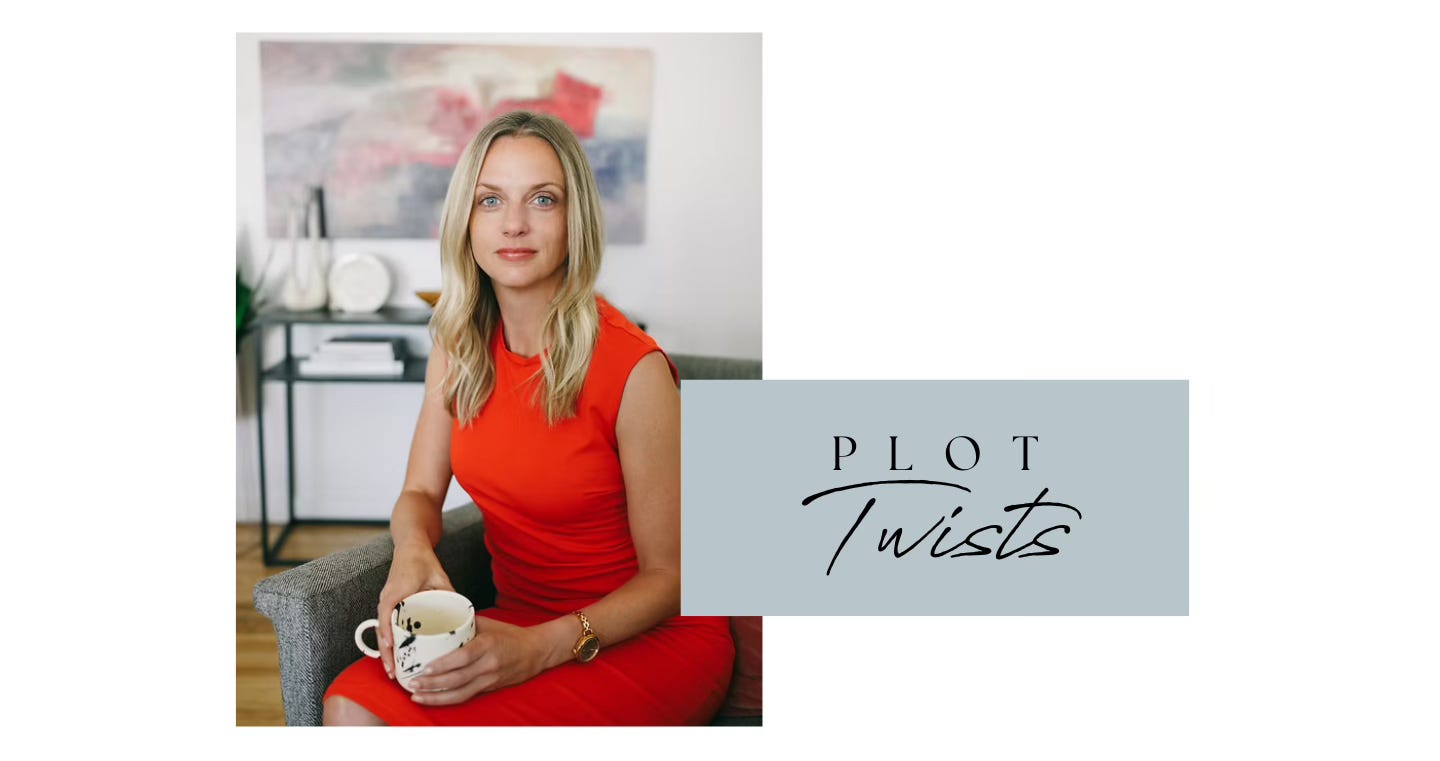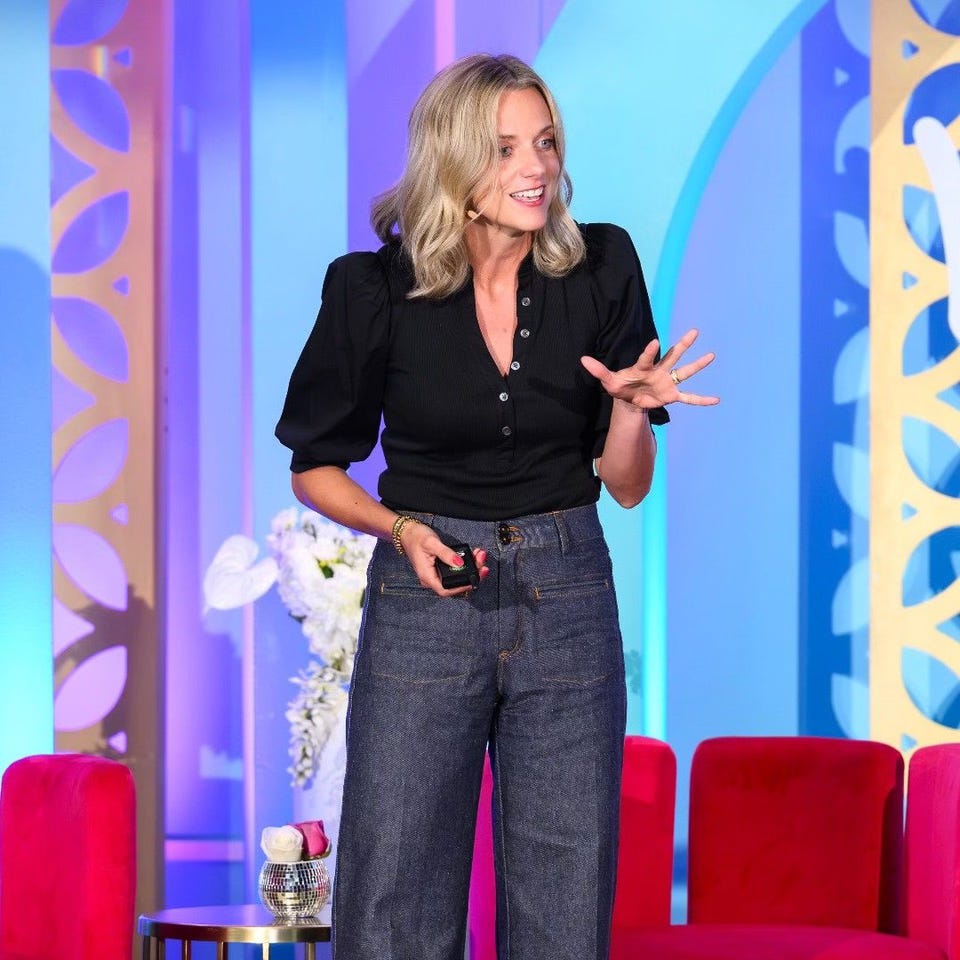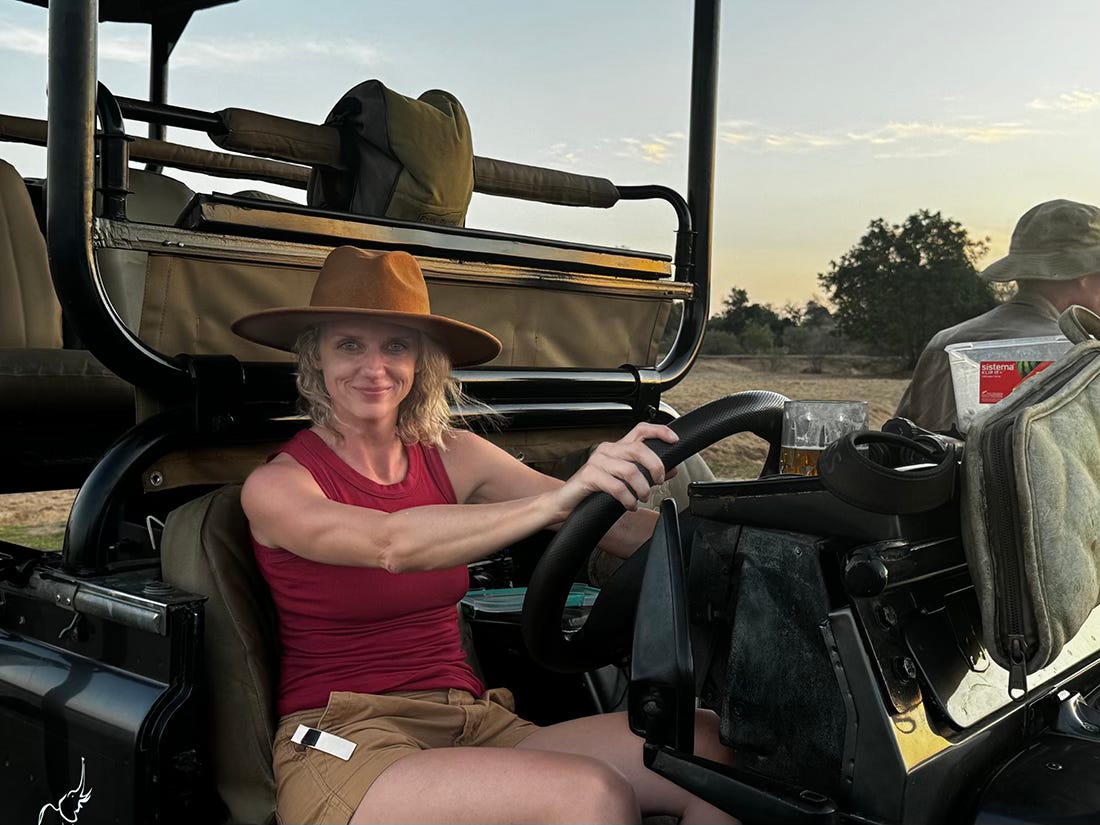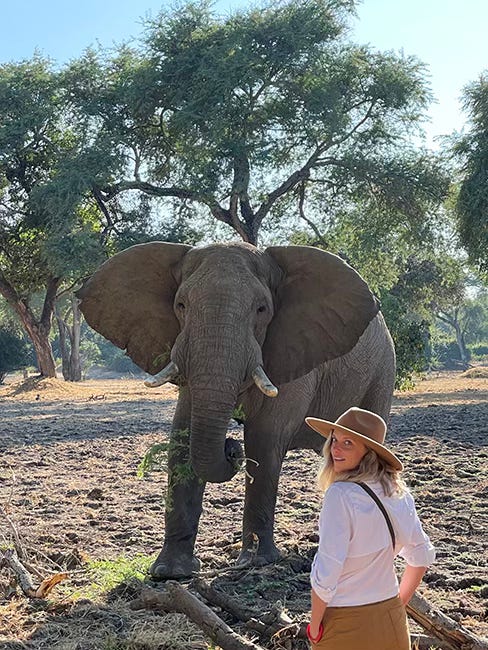Plot Twists: Laura Lyng
The former big-firm litigator on leaving law, tracking lions in Africa, and finding love after betting on herself
Plot Twists is a new interview series where I catch up with interesting people who’ve made bold career or life pivots. This month’s guest is my friend Laura Lyng. We met through a mutual friend in LA when she was a litigator for a big time global law firm.
After 17 years in LA, she moved to Denver, and completely reinvented herself as an executive coach with Novus Global—a role that takes her all over the world. We chatted about the hardest (and most rewarding) part of starting over, how she made the leap, and how finding the love of her life came after she did the work to create the life she really wanted.
We met in LA—gosh, I don’t even remember how many years ago! At the time, you were working at one of the top global law firms, right? What did you think your life would look like back then—and how did it actually look? I’d love to quickly hear a little of your back story, how long you lived in LA, etc.
Yes, when we met I was living in LA and working as a litigator (trial attorney) for a large international law firm. I moved to LA after undergrad and lived there for 17 years, which is a lifetime in LA-time! When I first arrived, I worked for a nonprofit and had the opportunity to travel internationally. I lived in different parts of the world, and those experiences deeply shaped my interest in justice.
But before I moved to law, since I was a theater major—and, well, when in Rome—I hit the streets with my headshot and gave the acting thing a shot. But I quickly tired of living in a big city with little money, and began asking myself, what could I do in the world that would make a meaningful contribution? Catering jobs and auditions for beer commercials somehow weren’t scratching that itch.
That curiosity led me to law school. I’d always been interested in law, so I took the entrance exam on a whim and decided to go. I’ve always loved being a student, so it was an easy decision in that sense. I worked hard and graduated in the top of my class and received an offer from a top law firm.
A lot of lawyers will tell you while you're still in law school, “Enjoy school, this is the best part.” The message is: “it’s all uphill from here.” I expected the work to be difficult, but I underestimated the toll of feeling constantly on-call, day and night, answering to judges, partners, and clients. It doesn’t look anything like The Good Wife or Suits. It looks like sitting in front of your computer for long hours, researching, writing briefs, arguing with other lawyers, and preparing for trial.
Moving from LA to Denver is a big lifestyle shift (I can relate!). How did you choose that city, and what surprised you most about the change?
I moved to Denver at the end of 2019—excellent timing, right before the pandemic. My firm had an office there, and I had a case in Colorado, so I had already been traveling back and forth. My sister was starting a family on the outskirts of Denver, and I imagined a life that was a little slower, with less traffic, more nature, and more time with family. That longing for a different pace and deeper connection prompted the move. I kept my job and transferred to the Denver office, continuing the same kind of law—at least for a while.
Then the pandemic hit, and transitioning to a new city as an adult, without an established community, became even more challenging.
I always credit you with giving me the courage to start a cookbook club. Do you remember asking me, “What are you willing to do to get the thing you say you want?” (in my case, community in Raleigh). How did you find community when you moved?
I do remember asking you that question, and I'm so proud of you for starting the Cookbook Club! I asked you the question because it is the same one my executive coach asked me. When I moved to Denver, finding community was hard—especially during a global pandemic. Making new friends in your 30s, as a single person without kids, isn’t easy.
The turning point came when I started working with an executive coach to help me navigate my career transition. In coaching, one thing we do is examine our complaints, and one of mine was: “I don’t have the kind of community I want here.” My coach asked me powerful questions that helped me shift my perspective and take ownership to create the life I wanted.
That’s when I started Eight Plates—a gathering where I invited seven strangers over to my home for a casual evening of food and meaningful conversation. Everyone met seven new people, and at the end of the night, they each added a name to the invite list for the next gathering. I always felt nervous before everyone would arrive, but by the end of the night my heart was so full and some really beautiful relationships and opportunities were birthed around that dining table.
You left your legal career a few years ago. What made you walk away from such a successful career? Was there a single breaking point—or more of a slow unraveling?
It’s a question I get asked a lot. From the outside, it looked like I was reaching the pinnacle of everything I’d worked for. It seems crazy. But I got tired of hearing myself complain about my life—about working too much, not having the time and space for relationships, purpose, and meaning. I got sick of hearing myself talk about these things without doing anything to change them. But I felt stuck and afraid to make a mistake.
When I was thinking about leaving the law, I reached out to a longtime friend, Jason Jaggard, CEO of Novus Global, an executive coaching firm. I’d heard about and observed the impact of their work, and decided to work with one of their coaches to reinvent my life into something I would absolutely love. I hired someone to fiercely advocate for my future by helping me expand what I believed was possible for me. My coach asked me the hard questions, held space for me to wrestle with my beliefs, gave me direct feedback on how I was getting in my own way, and held me to my word when I agreed to challenge myself and take risks.
Experiencing the transformation that coaching created in my own life made me want to offer that same impact to others. That’s how the pivot began.
How do you define success now, compared to when you were practicing law?
Back then, and for most of my life, success meant being the “best”—getting the “A”, winning the case, earning praise from colleagues, climbing the ladder. It was all about external validation, and it was exhausting.
Now, I want success to look like growth. Am I learning? Am I transforming? Am I creating the life I say I want? Sometimes growth looks like failure—because it involves risk, mistakes, and being uncomfortable. But if I can say, “Yes, I’m growing,” then I call that success. But beliefs don’t change overnight and some days I still wake up wanting the “A.” That’s why I’ll always have a coach and I’m committed to being gentle with myself in the process.
One of the things that sets Novus Global apart from other coaching practices is that we are committed to the fundamental belief that everyone we meet (including ourselves) is drastically underestimating what they are capable of. And that question, “I wonder what I’m capable of?” versus, “How can I be the best?” creates energy for me instead of depleting it.
What’s been the hardest part of starting over? And what’s been the most rewarding?
The hardest part was confronting my own beliefs about sunk costs. I’d worked so hard to get where I was—how could I leave? What would people think? Who would I be without this identity/career? Was leaving an objectively stupid thing to do?
My brain wanted to keep me safe by only looking at the costs of leaving—and not the costs of staying. The biggest hurdle was getting honest with myself about what staying was actually costing me. There were risks on both ends of the equation. But I new I’d be proud of myself for having the courage to create something new.
And the most rewarding part? Realizing I can reinvent myself and I can choose to make reinvention a lifestyle. I can trust that small voice saying, “There’s more,” and take bold steps in that direction. It’s been deeply fulfilling to prove to myself that I can take unconventional risks for the sake of cherishing my one and only life—and help others do the same.
Who is your ideal coaching client, and how can someone work with you?
My ideal client is a leader committed to growth and reinvention—someone who wants to invest in themselves and their future even though they are afraid. They’re ready to ask hard questions, shift their perspectives, and take risks to create greater impact with their lives. I work with a lot of women entrepreneurs and executives, but ultimately, my ideal client is simply someone who believes they’re capable of more and is looking for a partner to help unlock that.
Some people think coaching is for “fixing” people, but the truth is, my clients are often already thriving. They just have that small inner voice—like I did—that says, “There’s more.” My job is to partner with that voice and fiercely advocate for their vision. The greatest moments of my day are when I get a text from a client saying, “Wow, I didn’t know I could do that. I didn’t know my life could look like this.”If someone reading this is saying “I want that” they can reach out to me at lauralyng.com. Novus Global has a team of over 50 coaches and I love matchmaking a client to their coach.
You found the love of your life after making this big pivot. Do you think that would’ve happened if you’d stayed in your old life?
Honestly, no. Practically speaking, I met my husband because of this work—I was coaching a colleague of his. But more than that, I think the leap I took changed me. I became someone who’s open to possibility and willing to bet on myself. Reinvention is attractive—it draws people in. I was exploring new places, trying new hobbies—just saying “yes” to life in ways I hadn’t before. And I think that energy is magnetic. It’s something people notice. I was no longer just surviving or pushing through each day—I was actively creating a life I wanted to live. And I think that made me more open, more present, and ultimately more available for a deep, healthy relationship.
When I met my husband, he told me he was intrigued by the life I was creating—he read articles I’d written, and was drawn to my willingness to step into the unknown. So no, I don’t think our paths would’ve crossed if I’d stayed in my old life. Getting unstuck in my career helped me get unstuck in my dating life. We are whole people and progress begets progress.
“Getting unstuck in my career helped me get unstuck in my dating life.”
I love following your travels. While I know social media is just the highlight reel, you really seem to exude joy. What are some of your favorite places you’ve visited?
Thank you! One of the things I love about this work is that I get to travel all over the world to work with teams who want to explore what they are capable of together. I have led leadership development trainings and offered keynotes in different countries in Africa in the last few years and I really fell in love with Zimbabwe and South Africa. One of my hobbies in my reinvention was tracking lions and elephants on foot in the wild. My husband was so curious about it when we met and five months later we got engaged while on a walking safari in South Africa. We went back after we got married and we can’t wait to do it again.
What’s on your travel bucket list right now?
South America. I’ve never been. And Italy. I’d love to experience the Dolomites. But if I get the opportunity to go to Africa, I take it.
What advice would you give to someone thinking about making a pivot like yours, especially later in life or after a long career in one space?
I would say: listen to that voice that keeps whispering that there’s more for you. That you’re meant for something else, or something more expansive, even if you don’t know exactly what that is yet. Give that voice a forum and hear it out.
Also, bring in a team. You don’t have to do it alone. I think the myth of self-sufficiency can really keep people stuck. It’s courageous to ask for help, and I would never have made this leap without the support of a coach and a community around me. We can’t do surgery on our own brains. Bring in a fierce advocate who will champion your future in your moments of doubt.
I’d also say: get sober with yourself. Start asking, what are the costs of staying exactly where I am? Not just the obvious ones, but the subtle, emotional, relational, and creative costs. And then decide if you are willing to keep paying those. If not, take one bold step in a new direction.
The unknown can be terrifying, but staying stuck is a risk too—it’s just a quieter, sneakier one.
Ultimately, the greatest thing I’ve learned is that reinvention is always available to us. We’re never too far along or too established to change. You get to write your story. And if you don’t like the chapter you’re in, you can write a new one.
And that’s what I get to do now—not just for myself, but with my clients. It’s a privilege to help people discover what they’re capable of, and I feel deeply honored to get to be a part of their journey.
Click here to work with Laura.
Thank you, Laura!
xo
Molly












"What are you willing to do to get the thing you say you want?" THAT IS SO GOOD. I'll be chewing on that one for a while!
love these PLOT TWISTS - fascinating and inspiring! xx